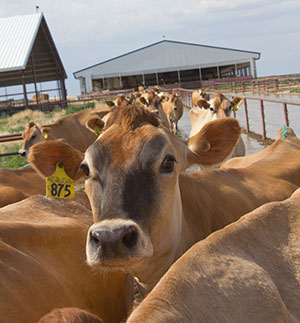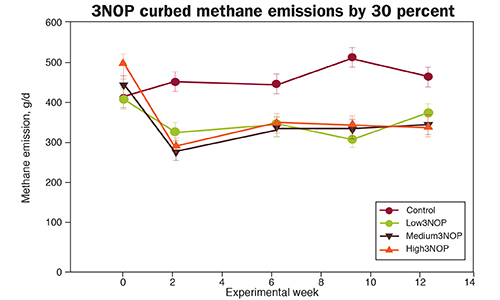by Amanda Smith, Associate Editor
 Courtesy of their rumen microbes, cows produce and release methane. As a ruminant-based industry, it's a reality we cannot escape. It is estimated that a quarter of anthropogenic, or human-caused, methane emissions are due to enteric (rumen) fermentation.
Courtesy of their rumen microbes, cows produce and release methane. As a ruminant-based industry, it's a reality we cannot escape. It is estimated that a quarter of anthropogenic, or human-caused, methane emissions are due to enteric (rumen) fermentation.
While methane production by ruminants is inevitable, a compound, 3-nitrooxypropanol or 3NOP, may help curb enteric methane emissions from lactating cows by nearly 30 percent. The study, conducted by Penn State, was recently published in the Proceedings of the National Academy of Science.
A 48-cow, 12-week study tested the effect of 3NOP, a methane inhibitor, on enteric emissions in lactating Holstein cows. Cows were fed 0, 40, 60 or 80 milligrams of 3NOP per kilogram (2.2 pounds) of dry matter.
Feed intake, milk production and fiber digestibility were not affected by the inhibitor. Meanwhile, milk protein and lactose yield were elevated for 3NOP-supplemented cows.
Methane emissions were measured when cows put their heads into feeding chambers that had atmospheric measurement sensors and also through nostril tubes attached to canisters on their backs. Rumen methane emission declined linearly with the additive, averaging about 30 percent less than the control group (Figure below).

To comment, email your remarks to intel@hoards.com.
 Courtesy of their rumen microbes, cows produce and release methane. As a ruminant-based industry, it's a reality we cannot escape. It is estimated that a quarter of anthropogenic, or human-caused, methane emissions are due to enteric (rumen) fermentation.
Courtesy of their rumen microbes, cows produce and release methane. As a ruminant-based industry, it's a reality we cannot escape. It is estimated that a quarter of anthropogenic, or human-caused, methane emissions are due to enteric (rumen) fermentation. While methane production by ruminants is inevitable, a compound, 3-nitrooxypropanol or 3NOP, may help curb enteric methane emissions from lactating cows by nearly 30 percent. The study, conducted by Penn State, was recently published in the Proceedings of the National Academy of Science.
A 48-cow, 12-week study tested the effect of 3NOP, a methane inhibitor, on enteric emissions in lactating Holstein cows. Cows were fed 0, 40, 60 or 80 milligrams of 3NOP per kilogram (2.2 pounds) of dry matter.
Feed intake, milk production and fiber digestibility were not affected by the inhibitor. Meanwhile, milk protein and lactose yield were elevated for 3NOP-supplemented cows.
Methane emissions were measured when cows put their heads into feeding chambers that had atmospheric measurement sensors and also through nostril tubes attached to canisters on their backs. Rumen methane emission declined linearly with the additive, averaging about 30 percent less than the control group (Figure below).

The spared methane was partially used for tissue synthesis; on average, the body weight gain of 3NOP-treated cows was 80 percent greater than control cows. The weight promoting effect of the additive may have implications in limiting early-lactation energy losses.
If approved by the FDA, this methane inhibitor could have a significant impact on greenhouse gas emissions from the livestock sector, noted lead researcher Alex Hristov.








